Unit 1 Great Scientists Listening and speaking
文档属性
| 名称 | Unit 1 Great Scientists Listening and speaking |
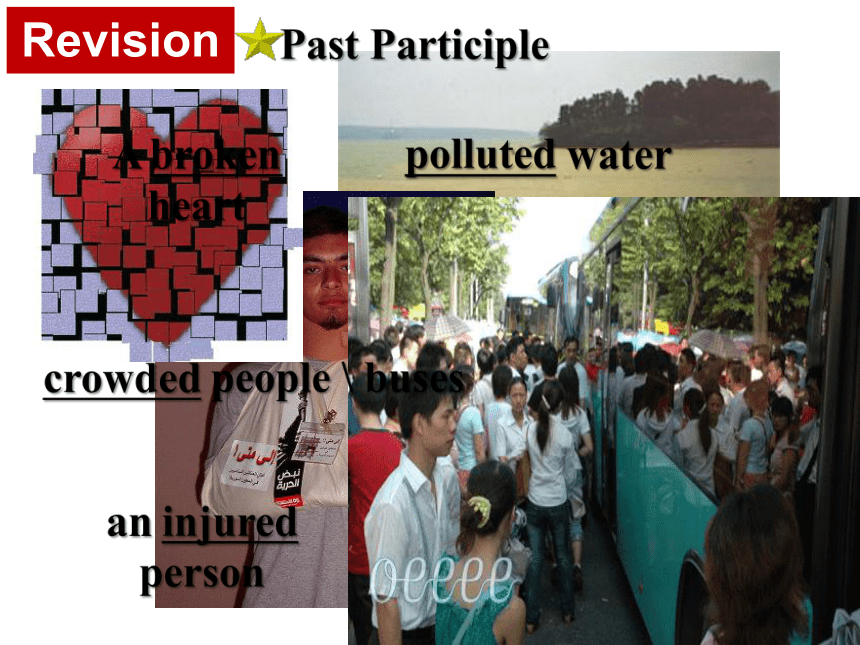
|
|
| 格式 | rar | ||
| 文件大小 | 1.9MB | ||
| 资源类型 | 教案 | ||
| 版本资源 | 人教版(新课程标准) | ||
| 科目 | 英语 | ||
| 更新时间 | 2009-10-12 00:00:00 | ||
图片预览

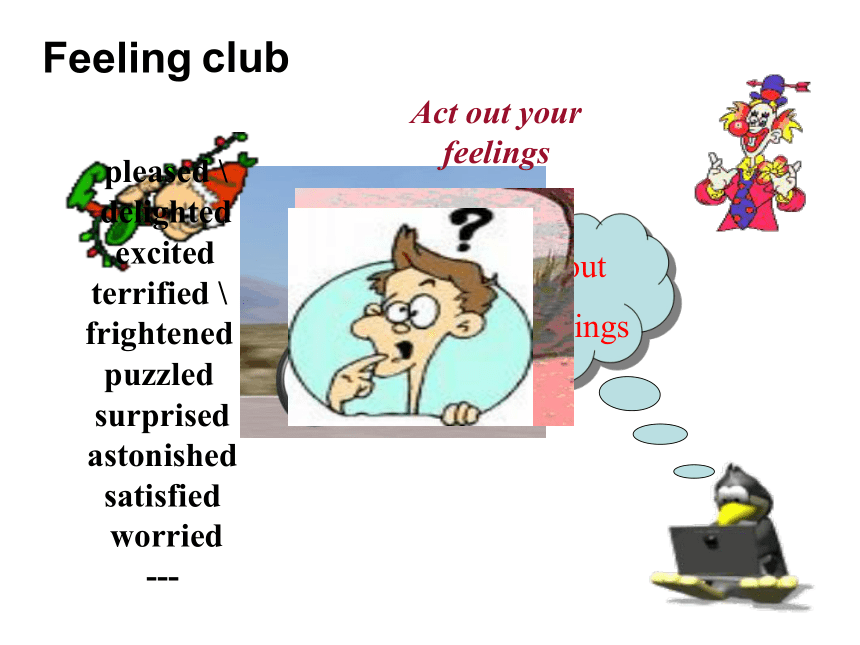
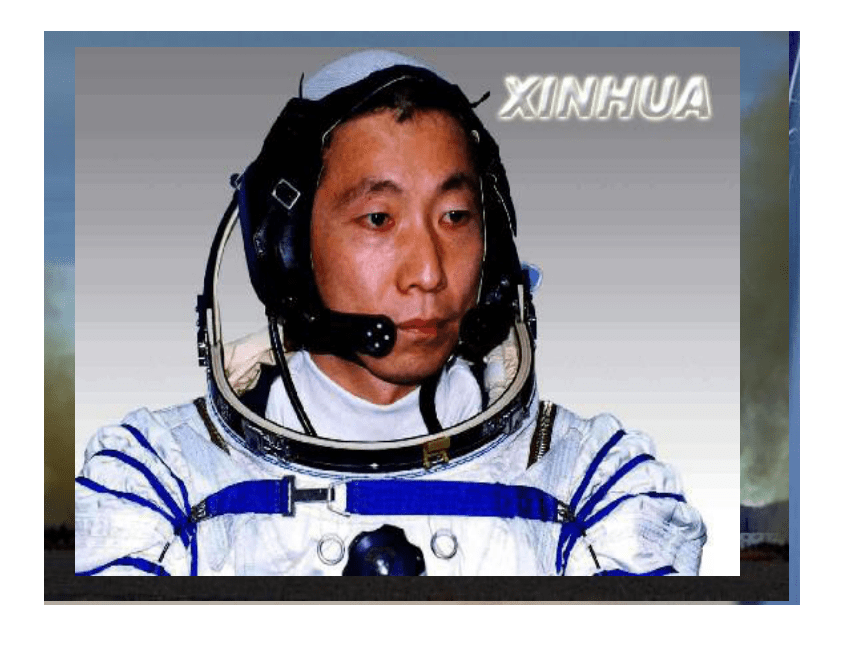
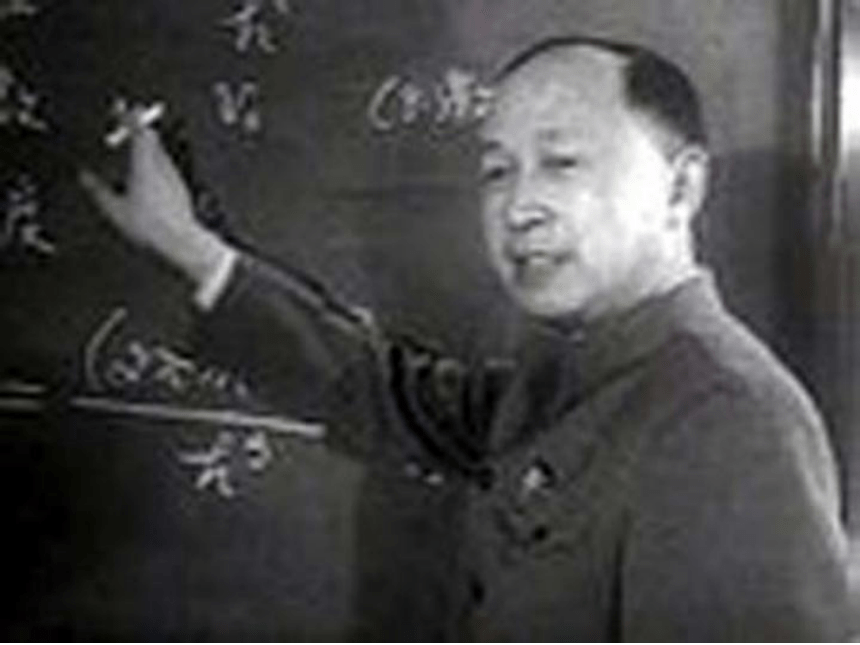
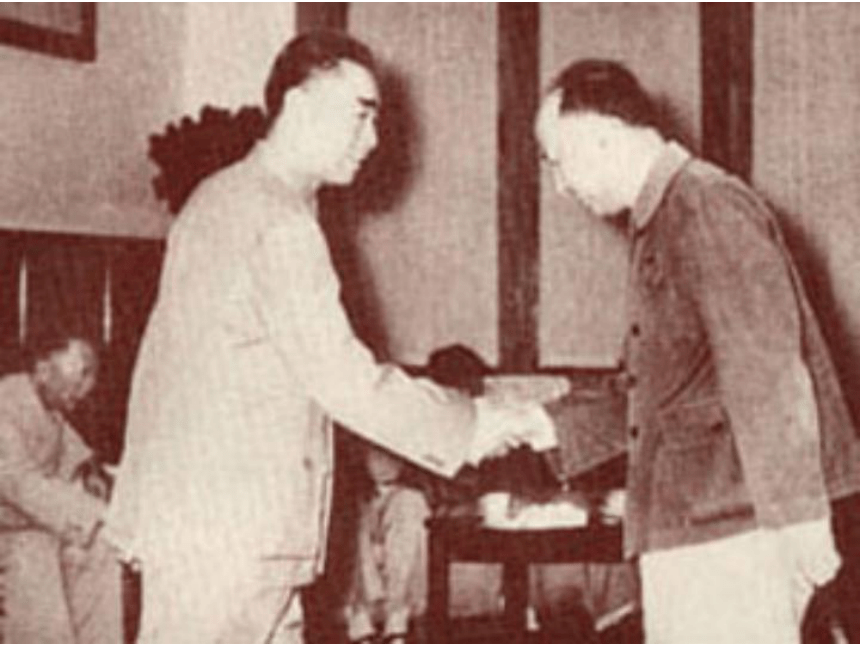
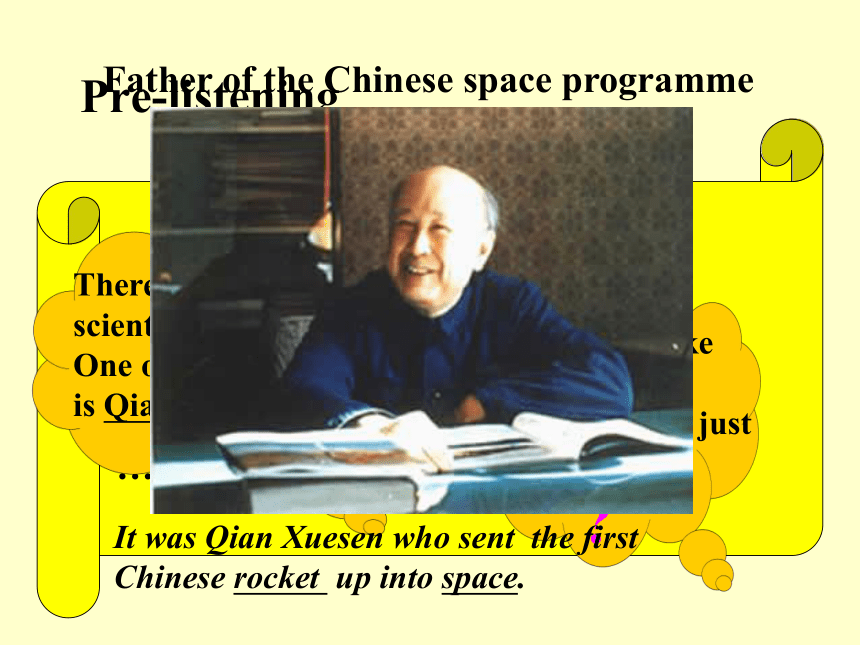
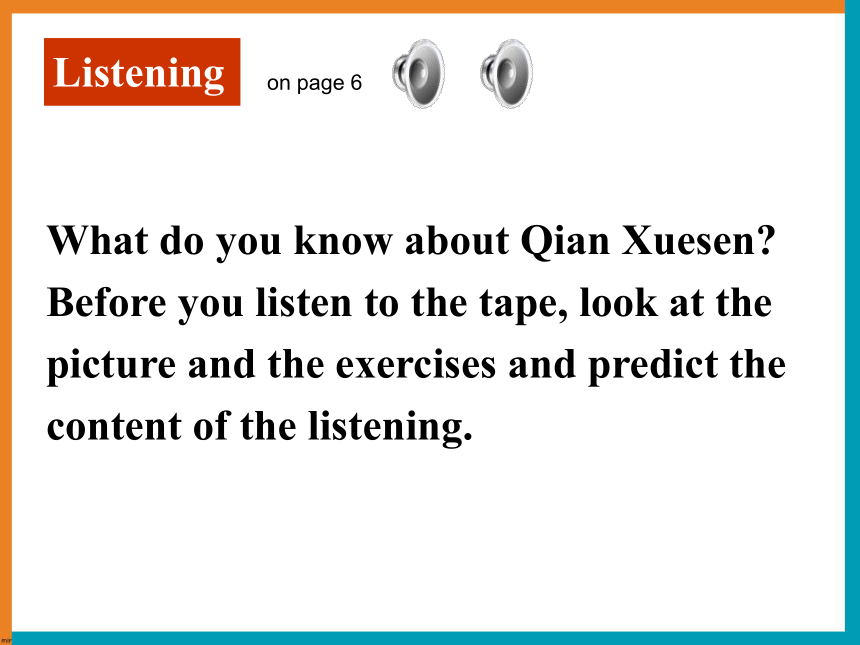
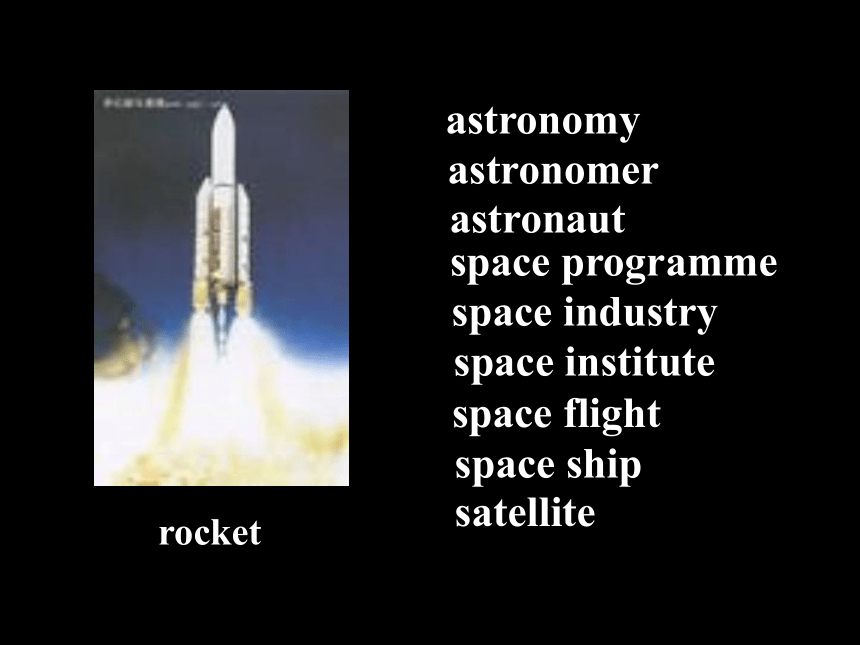
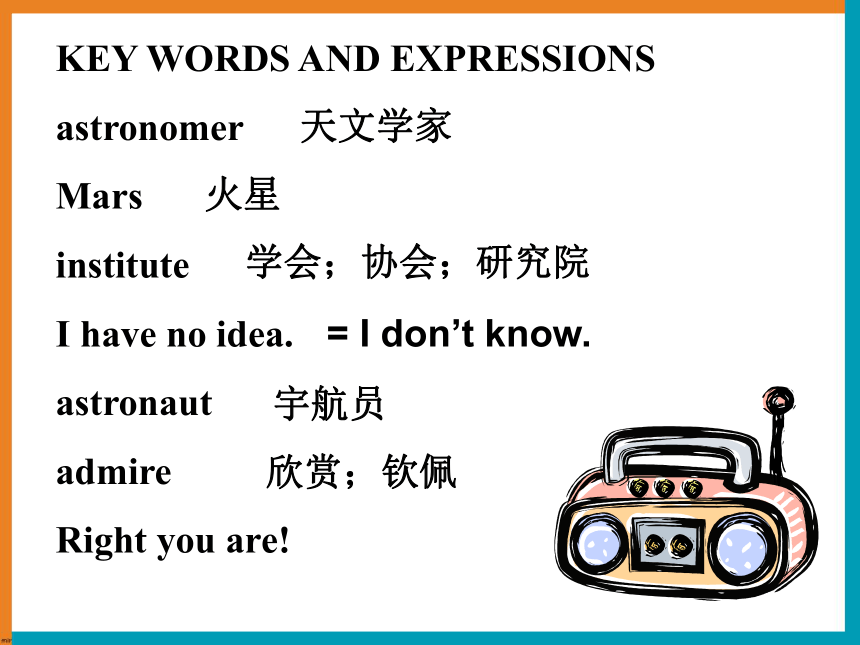
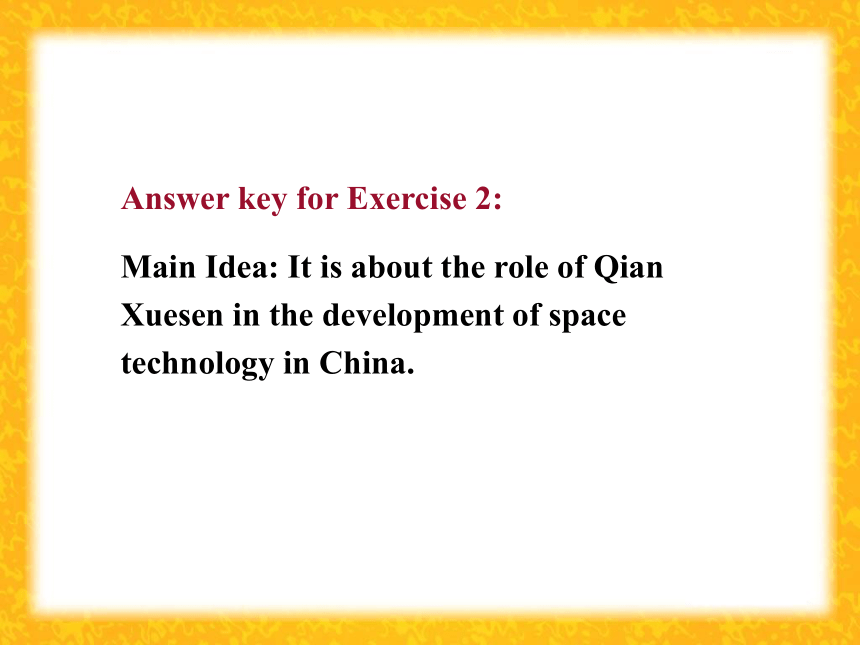
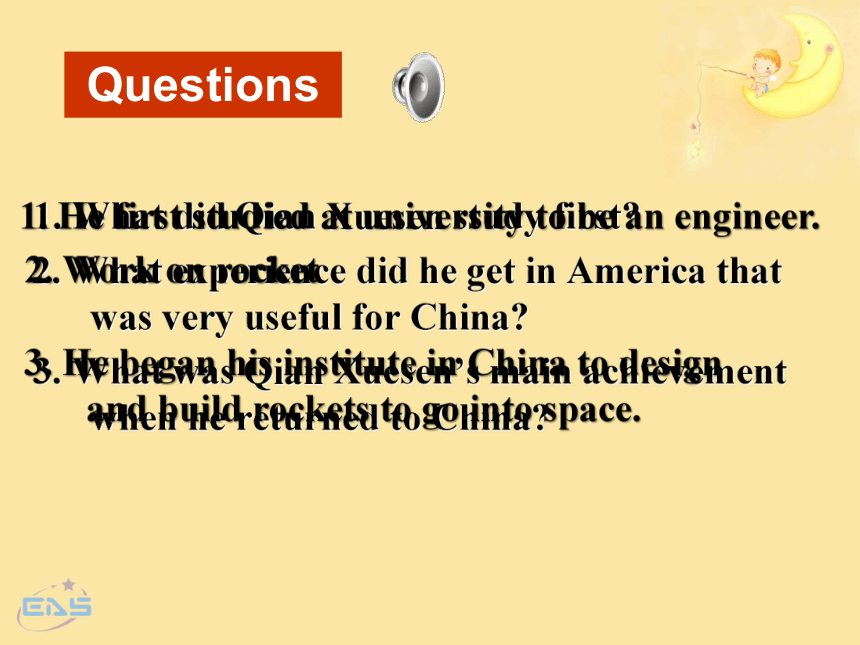
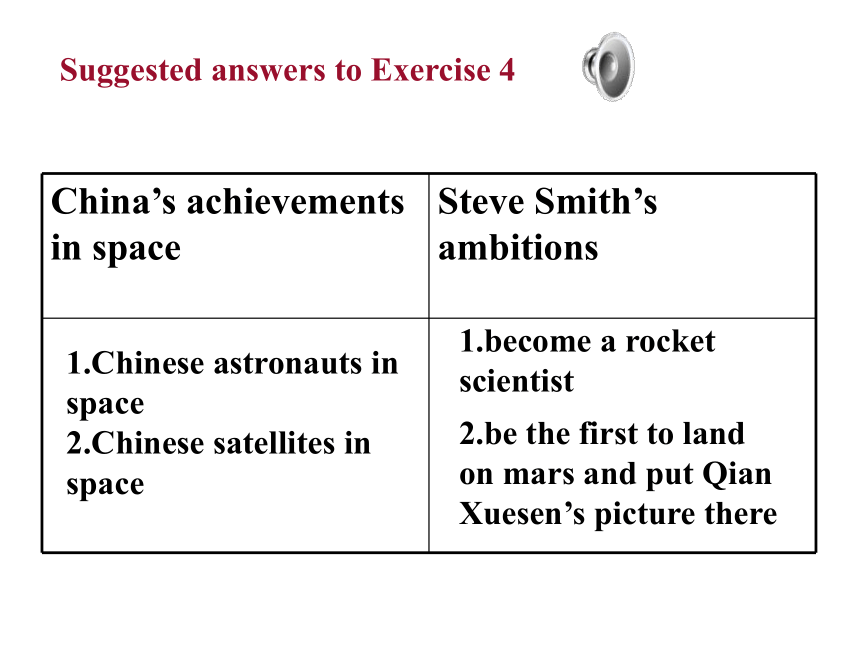
文档简介
课件38张PPT。disappointed discouragedA broken heartpolluted wateran injured personcrowded people busesRevisionPast ParticipleFeeling
Shout out
your feelingsclubpleased delightedexcitedterrified frightenedpuzzledsurprised astonished
satisfied
worried
---Act out your feelingsPre-listeningWhat job do they do?
They are astronauts
What personality is needed?
…….
There are a lot of great scientists behind them. One of the best-known is Qian Xuesen.?
It was Qian Xuesen who sent the first
Chinese rocket up into space.
Father of the Chinese space programmeListeningWhat do you know about Qian Xuesen? Before you listen to the tape, look at the picture and the exercises and predict the content of the listening. on page 6rocketsatelliteastronomyastronomerastronautspace programmespace industryspace institutespace flightspace shipKEY WORDS AND EXPRESSIONS
astronomer
Mars
institute
I have no idea.
astronaut
admire
Right you are!天文学家火星学会;协会;研究院= I don’t know.宇航员欣赏;钦佩Answer key for Exercise 2:
Main Idea: It is about the role of Qian Xuesen in the development of space technology in China.1. What did Qian Xuesen study first?
2. What experience did he get in America that was very useful for China?
3. What was Qian Xuesen’s main achievement when he returned to China?Questions1. He first studied at university to be an engineer. 2. Work on rocket 3. He began his institute in China to design and build rockets to go into space.Suggested answers to Exercise 4Chinese astronauts in space
Chinese satellites in spacebecome a rocket scientist
be the first to land on mars and put Qian Xuesen’s picture thereYP: What do you want to be when you ____ ____, Steve?
SS: I want to be an astronomer and visit stars. I
wish to visit Mars one day.
YP: I think I’d like to work in the _____ industry
too. I’d like to be a rocket _______ like Qian Xuesen.
SS: What did he have to do to become a rocket scientist?
YP: Well, he first studied at university to be an engineer.
Later he want to America to study for his ________
degree. It was then he began to work on _______.grow upspacescientistdoctor’s rocketsFill in the blanksSS: So it was lucky for our _____ __________ that he
came back to China.
YP: Very much so. There was no work on space rockets
in China before he began his institute to ______ and
build rockets to go into space.
SS: Do you think he wanted to travel into space in one of
his rockets?
YP: I have no idea but I believe he ____ _______ ___ the
first space flight by a Chinese astronaut.space programdesignlook forward toSS: Yes. Now China has sent ________ into space. I
hope that we’ll be ___ ___ to land on Mars. That would
really be something special and if I were that astronaut
I would put Qian Xuesen’s picture on Mars to show
how much we ______ his work.
YP: Indeed. He is rightfully called ___ _____ of the
Chinese space program. He is my hero and he is why
I want to be a rocket scientist.
SS: Well, we’d better ___ __ ____our homework. We need
good grades to get into university.
YP: Right you are. See you, then.
SS: See you. satellitesthe firstadmirethe fatherget on with Mr Qian is preparing for a very important scientific programme. So there will be an interview to employ an assistant to help complete the programme.SpeakingPre-interview Let’s share ideas to get ready for the interviewThese questions may help you:
What kind of scientific job do you want to do?
What personality will be needed?
What work experience would be useful?
Why are you so interested in this job?
What education will you need?
How long will the training take?
How will you prepare for this career?Theses expressions may help you:
I always wanted to..because…
The experience I will need is …
I need to practise …
I think I’m good at … so …
I will need some training in …
I might find it difficult to …
My greatest problem will be to …I will need to be/become
patient, creative, hard-working, co-operative, confident, brave, positive, pleasant, polite, determined, energetic, strict with, …Sample conversation:A : What do you want to do when you grow up?
B: I want to build robots. I will have to do a physics and mathematics degree in China. After that I hope to go abroad to Reading University in England where you can study all about robots. There is a special cybernetics(控制论) department there.
A: What personality will be needed for that job?
B: I think I need to be patient for my ideas which will take a long time to develop. I also need to be creative enough to have good ideas.A: What experience will be most useful to you?
B: I think technology and engineering projects. I hope to work in a factory in my holidays.
A: What kind of person makes a good inventor?
B: I think technology and engineering projects. I hope to work in a factory in my holidays.
A: What kind of person will make a good inventor?
B: I think someone who is happy to persevere at something and learns from his mistakes.
A: Thank you. I think designing robots sounds fun.Answer key for Exercise 1:
Possible answers include:
Go to your teacher
Go to a natural museum and speak to a specialist
Look it up in a flower bookListeningon page 41Answer key for Exercise 2:
The correct answer is C.
Summary A is not correct because it does not give enough information.
Summary B is inaccurate.Answer key for Exercise 3:
Biology,
book,
Sweden,
1707,
1778,
seriousAnswer key for Exercise 4:
It means that his flower has already been identified and has a name.
He would know by checking his lily against other lilies in the specialist book. If his lily is different (for example in the number of petals or stamens) it will be a new species.All plants have two names just like people. The first is the group of flowers they belong to and is like the family name. The second is the kind of flower within that group and is like a given/personal name.
Before Linnaeis there was no way of finding out whether a plant was new or not. This caused problems because different scientists claimed that they had found and named flowers first. After he organized his system it was easy to discover whether a plant was new or not and so who had the right to name it.NAMING FLOWERRobert Briggs (RB) is talking to Zhang Wei (ZW) about a new kind of lily he has found.ZW: Hello Robert. What’s that book you’re carrying?
RB: A book that helps you identify a flower.
ZW: I see. Why do you want that?
RB: Well, I’ve found this lily. It looks different to me. So I want to find out if it’s new or not. Our biology teacher told me that If it’s already known, I’d find it in this book.
ZW: Wow! So you think may have found a new lily?
RB: I hope so, but I have to do some research first to find out for sure.ZW: What happens if It’s in the book?
RB: It means that somebody else has found it and named it. Then I’ll know its biological name.
ZW: What do you mean by the biological name?
RB: Actually like us a flower has two names. The first is the group of flowers it belongs to-like a family name. A rose is one such group. The second is the kind of flower-like a given name. It may describe what the rose looks like; for example, the colour of an autumn sunset.. Together you get the flower’s name, which is Rose Autumn Sunset.
ZW: Gosh! Who made that system?
RB: A great scientist called Carl Linnaeus. He lived in Sweden from 1707 to 1778.ZW: So long ago!
RB: Yes, and he solved a very serious problem for biology.
ZW: What was that?
RB: Before him nobody could tell if a plant was new, as there was no way of checking. There’re so many plants, you see!
ZW: Yes, I appreciate that! So his system is still used?
RB: Indeed it is. If my flower isn’t in this book, I’ll know that I’ve found a new kind of lily.
ZW: That’s great! Can I come and help you? This research sounds fun.
RB: Yes, and if I’m lucky…(fading out)Answer key for Exercise 1:
Students will give their own answers which may very.Answer key for Exercise 3:
Tick all symbols except angle.Listening Task on page 44Answer key for Exercise 4:Why Euler is considered to be a great mathematicianintroduced many new symbols into maths
wrote more books than anyone before or since
discovered a new branch of mathematicsSuggest answers to Exercise 5:
It had a river running through it. The centre of konigsberg is an island and as it passes the island the river breaks into two parts. Seven bridges were built so that the people of the city could get from one part to another. The people wondered if you could walk around the city so that you would cross each bridge only once.Suggested answers to Exercise 6:
There is no Euler path for this figure. Look at Figure 4 in the Reading task. It is a Euler path for Figure 3.A MATHEMATICIAN’S PROBLEM
John Smith (JS) is talking to Zhao Yang (ZY) about a mathematician who interests him.
Part 1
JS: Do you know that we’ve been studying Euler in maths?
ZY: Who is he? I’ve never heard of him.
JS: Well, he was a famous mathematician in the eighteenth century. He revised all the pure mathematics that was know in his day.
ZY: That probably wasn’t very much.JS: You’re wrong there. He wrote more than any other mathematician before or since.
ZY: Really! Well, what did he do?
JS: He introduced a lot of symbols into mathematics such as pi and the terms sine and cosine.
ZY: Wow!
JS: And he did half of this work when he was blind.
ZY: How did he do that?
JS: He told his ideas to someone else who wrote them down.Part 2
ZY: What were his achievements?
JS: He introduced a new branch of mathematics called topology. It helps you understand things by using diagrams. The subway map is a good example. It doesn’t tell you distances but it shows how stations connect together.
ZY: How did he start topology?JS: Well, in 1735 he was inspired by a problem in the city of Konigsberg where he lived. Look at the map in your book. Konigsberg had a river running through it.. The centre is an island. As the river passes the island. It breaks into two parts. Seven bridges were built over the river. Euler wondered if you could walk around the city so that you cross each bridge only once.
ZY: Let me try that. It sounds quite simple to me.
JS: Let me try that. It sounds quite simple to me.
JS: Try, but it’s not easy as it looks.
Shout out
your feelingsclubpleased delightedexcitedterrified frightenedpuzzledsurprised astonished
satisfied
worried
---Act out your feelingsPre-listeningWhat job do they do?
They are astronauts
What personality is needed?
…….
There are a lot of great scientists behind them. One of the best-known is Qian Xuesen.?
It was Qian Xuesen who sent the first
Chinese rocket up into space.
Father of the Chinese space programmeListeningWhat do you know about Qian Xuesen? Before you listen to the tape, look at the picture and the exercises and predict the content of the listening. on page 6rocketsatelliteastronomyastronomerastronautspace programmespace industryspace institutespace flightspace shipKEY WORDS AND EXPRESSIONS
astronomer
Mars
institute
I have no idea.
astronaut
admire
Right you are!天文学家火星学会;协会;研究院= I don’t know.宇航员欣赏;钦佩Answer key for Exercise 2:
Main Idea: It is about the role of Qian Xuesen in the development of space technology in China.1. What did Qian Xuesen study first?
2. What experience did he get in America that was very useful for China?
3. What was Qian Xuesen’s main achievement when he returned to China?Questions1. He first studied at university to be an engineer. 2. Work on rocket 3. He began his institute in China to design and build rockets to go into space.Suggested answers to Exercise 4Chinese astronauts in space
Chinese satellites in spacebecome a rocket scientist
be the first to land on mars and put Qian Xuesen’s picture thereYP: What do you want to be when you ____ ____, Steve?
SS: I want to be an astronomer and visit stars. I
wish to visit Mars one day.
YP: I think I’d like to work in the _____ industry
too. I’d like to be a rocket _______ like Qian Xuesen.
SS: What did he have to do to become a rocket scientist?
YP: Well, he first studied at university to be an engineer.
Later he want to America to study for his ________
degree. It was then he began to work on _______.grow upspacescientistdoctor’s rocketsFill in the blanksSS: So it was lucky for our _____ __________ that he
came back to China.
YP: Very much so. There was no work on space rockets
in China before he began his institute to ______ and
build rockets to go into space.
SS: Do you think he wanted to travel into space in one of
his rockets?
YP: I have no idea but I believe he ____ _______ ___ the
first space flight by a Chinese astronaut.space programdesignlook forward toSS: Yes. Now China has sent ________ into space. I
hope that we’ll be ___ ___ to land on Mars. That would
really be something special and if I were that astronaut
I would put Qian Xuesen’s picture on Mars to show
how much we ______ his work.
YP: Indeed. He is rightfully called ___ _____ of the
Chinese space program. He is my hero and he is why
I want to be a rocket scientist.
SS: Well, we’d better ___ __ ____our homework. We need
good grades to get into university.
YP: Right you are. See you, then.
SS: See you. satellitesthe firstadmirethe fatherget on with Mr Qian is preparing for a very important scientific programme. So there will be an interview to employ an assistant to help complete the programme.SpeakingPre-interview Let’s share ideas to get ready for the interviewThese questions may help you:
What kind of scientific job do you want to do?
What personality will be needed?
What work experience would be useful?
Why are you so interested in this job?
What education will you need?
How long will the training take?
How will you prepare for this career?Theses expressions may help you:
I always wanted to..because…
The experience I will need is …
I need to practise …
I think I’m good at … so …
I will need some training in …
I might find it difficult to …
My greatest problem will be to …I will need to be/become
patient, creative, hard-working, co-operative, confident, brave, positive, pleasant, polite, determined, energetic, strict with, …Sample conversation:A : What do you want to do when you grow up?
B: I want to build robots. I will have to do a physics and mathematics degree in China. After that I hope to go abroad to Reading University in England where you can study all about robots. There is a special cybernetics(控制论) department there.
A: What personality will be needed for that job?
B: I think I need to be patient for my ideas which will take a long time to develop. I also need to be creative enough to have good ideas.A: What experience will be most useful to you?
B: I think technology and engineering projects. I hope to work in a factory in my holidays.
A: What kind of person makes a good inventor?
B: I think technology and engineering projects. I hope to work in a factory in my holidays.
A: What kind of person will make a good inventor?
B: I think someone who is happy to persevere at something and learns from his mistakes.
A: Thank you. I think designing robots sounds fun.Answer key for Exercise 1:
Possible answers include:
Go to your teacher
Go to a natural museum and speak to a specialist
Look it up in a flower bookListeningon page 41Answer key for Exercise 2:
The correct answer is C.
Summary A is not correct because it does not give enough information.
Summary B is inaccurate.Answer key for Exercise 3:
Biology,
book,
Sweden,
1707,
1778,
seriousAnswer key for Exercise 4:
It means that his flower has already been identified and has a name.
He would know by checking his lily against other lilies in the specialist book. If his lily is different (for example in the number of petals or stamens) it will be a new species.All plants have two names just like people. The first is the group of flowers they belong to and is like the family name. The second is the kind of flower within that group and is like a given/personal name.
Before Linnaeis there was no way of finding out whether a plant was new or not. This caused problems because different scientists claimed that they had found and named flowers first. After he organized his system it was easy to discover whether a plant was new or not and so who had the right to name it.NAMING FLOWERRobert Briggs (RB) is talking to Zhang Wei (ZW) about a new kind of lily he has found.ZW: Hello Robert. What’s that book you’re carrying?
RB: A book that helps you identify a flower.
ZW: I see. Why do you want that?
RB: Well, I’ve found this lily. It looks different to me. So I want to find out if it’s new or not. Our biology teacher told me that If it’s already known, I’d find it in this book.
ZW: Wow! So you think may have found a new lily?
RB: I hope so, but I have to do some research first to find out for sure.ZW: What happens if It’s in the book?
RB: It means that somebody else has found it and named it. Then I’ll know its biological name.
ZW: What do you mean by the biological name?
RB: Actually like us a flower has two names. The first is the group of flowers it belongs to-like a family name. A rose is one such group. The second is the kind of flower-like a given name. It may describe what the rose looks like; for example, the colour of an autumn sunset.. Together you get the flower’s name, which is Rose Autumn Sunset.
ZW: Gosh! Who made that system?
RB: A great scientist called Carl Linnaeus. He lived in Sweden from 1707 to 1778.ZW: So long ago!
RB: Yes, and he solved a very serious problem for biology.
ZW: What was that?
RB: Before him nobody could tell if a plant was new, as there was no way of checking. There’re so many plants, you see!
ZW: Yes, I appreciate that! So his system is still used?
RB: Indeed it is. If my flower isn’t in this book, I’ll know that I’ve found a new kind of lily.
ZW: That’s great! Can I come and help you? This research sounds fun.
RB: Yes, and if I’m lucky…(fading out)Answer key for Exercise 1:
Students will give their own answers which may very.Answer key for Exercise 3:
Tick all symbols except angle.Listening Task on page 44Answer key for Exercise 4:Why Euler is considered to be a great mathematicianintroduced many new symbols into maths
wrote more books than anyone before or since
discovered a new branch of mathematicsSuggest answers to Exercise 5:
It had a river running through it. The centre of konigsberg is an island and as it passes the island the river breaks into two parts. Seven bridges were built so that the people of the city could get from one part to another. The people wondered if you could walk around the city so that you would cross each bridge only once.Suggested answers to Exercise 6:
There is no Euler path for this figure. Look at Figure 4 in the Reading task. It is a Euler path for Figure 3.A MATHEMATICIAN’S PROBLEM
John Smith (JS) is talking to Zhao Yang (ZY) about a mathematician who interests him.
Part 1
JS: Do you know that we’ve been studying Euler in maths?
ZY: Who is he? I’ve never heard of him.
JS: Well, he was a famous mathematician in the eighteenth century. He revised all the pure mathematics that was know in his day.
ZY: That probably wasn’t very much.JS: You’re wrong there. He wrote more than any other mathematician before or since.
ZY: Really! Well, what did he do?
JS: He introduced a lot of symbols into mathematics such as pi and the terms sine and cosine.
ZY: Wow!
JS: And he did half of this work when he was blind.
ZY: How did he do that?
JS: He told his ideas to someone else who wrote them down.Part 2
ZY: What were his achievements?
JS: He introduced a new branch of mathematics called topology. It helps you understand things by using diagrams. The subway map is a good example. It doesn’t tell you distances but it shows how stations connect together.
ZY: How did he start topology?JS: Well, in 1735 he was inspired by a problem in the city of Konigsberg where he lived. Look at the map in your book. Konigsberg had a river running through it.. The centre is an island. As the river passes the island. It breaks into two parts. Seven bridges were built over the river. Euler wondered if you could walk around the city so that you cross each bridge only once.
ZY: Let me try that. It sounds quite simple to me.
JS: Let me try that. It sounds quite simple to me.
JS: Try, but it’s not easy as it looks.
